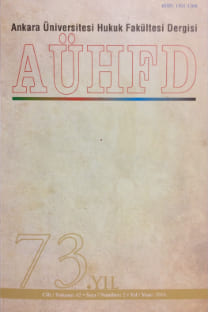İSVİÇRE VE TÜRK YARGI KARARLARINDA ESER KAVRAMI, ÖZELLİKLE ESTETİK OPERASYONU KONU EDİNEN SÖZLEŞMENİN HUKUKİ NİTELİĞİNE İLİŞKİN OLARAK YARGITAY’IN YAKLAŞIMI: GÜNCEL BİR BAKIŞ
The Concept of “Work” in Swiss and Turkish Judicial Decisions and Especially the Court of Cassation’s Approach regarding the Legal Character of Contracts about Cosmetic Surgery: A Current Perspective
___
- Altaş, Hüseyin: Eserin Teslimden Önce Telef Olması (BK. mad. 368), Ankara 2002.
- Aral, Fahrettin/Ayrancı, Hasan: Borçlar Hukuku, Özel Borç İlişkileri, 11. Baskı, Ankara 2015.
- Arıncı, Atilla/Usta, Sevgi: Estetik Amaçlı Tıbbi Müdahalelerde Hekimin Hukuki Sorumlulukları ve Eser Sözleşmesi, Turkish Journal of Plastic Surgery, 2017; 25 (2), s. 84- 93.
- Ayan, Mehmet: Tıbbi Müdahalelerden Doğan Hukuki Sorumluluk, Ankara 1991.
- Bögli, Roman: Der Übergang von der unternehmerischen Leistungspflicht zur Mängelhaftung beim Werkvertrag, Zeitpunkt und Voraussetzungen, Bern 1996.
- Büchler, Andrea/Michel, Margot: Medizin- Mensch- Recht, Eine Einführung in das Medizinrecht der Schweiz, Zürich 2014.
- Büyükay, Yusuf: Eser Sözleşmesi, 2. Baskı, Ankara 2014.
- Eren, Fikret: Borçlar Hukuku, Özel Hükümler, 5. Baskı, Ankara 2017.
- Gauch, Peter: Der Werkvertrag, 5. Auflage, Zürich 2011.
- Gautschi, Georg: Berner Kommentar zum Schweizerischen Privatrecht, Band VI, Das Obligationenrecht, 2. Abteilung, Die Einzelnen Vertragsverhältnisse, 3. Teilband, Der Werkvertrag, Art. 363- 379 OR, 2. Auflage, Bern 1967.
- Giger, Hans: Analyse der haftpflichtrechtlichen Situation im Hinblick auf die chirurgische Schönheitsoperation, Ohne jegliche Haftung – Festschrift für Willi Fischer, Beiträge zum schweizerischen Haftpflicht- und Schuldrecht, Zürich 2016, s. 161- 179.
- Hürlimann, Roland/Siegenthaler, Thomas: Handkommentar zum Schweizer Privatrecht, Vertragsverhältnisse, Teil 2, Arbeitsvertrag, Werkvertrag, Auftrag, GoA, Bürgschaft, 3. Auflage, Zürich 2016.
- Kaya, Mine: Estetik Müdahalelerde Hekimin Aydınlatma Yükümlülüğünün Kapsamı, Terazi Hukuk Dergisi, Cilt 11, Sayı 117, Mayıs 2016, s. 23- 37.
- Koller, Alfred: Schweizerisches Werkvertragsrecht, Zürich 2015 (Koller, N.).
- Koller, Alfred: Berner Kommentar, Band VI, Obligationenrecht, 2. Abteilung, Die einzelnen Vertragsverhältnisse, 3. Teilband, 1. Unterteilband, Der Werkvertrag, Art. 363- 366, Bern 1998 (Koller, Art.).
- Kurt, Leyla Müjde: Yüklenicinin Eseri Teslim Borcunda Temerrüdü (6098 Sayılı Türk Borçlar Kanunu Hükümlerine Göre), Ankara 2012.
- Majid, Nadja: Die Geschäftsfähigkeit der urteilsfähigen minderjährigen Person im Bereich der Schönheitsoperationen- Rechtslage, Kritik und Postulat, Zürich 2017.
- Memiş, Yusuf: (Yargıtay Kararları Işığı Altında) Estetik Ameliyatlardan Doğan Hukuki Sorumluluk, Terazi Hukuk Dergisi, Cilt 11, Sayı 119, Temmuz 2016, s. 174- 221.
- Nägeli, Max: Die ärztliche Behandlung handlungsunfähiger Patienten aus zivilrechtlicher Sicht, Zürich 1984.
- Özay, Merter: Estetik Amaçlı Tıbbi Müdahalelerde Hekimin Hukuki Sorumluluğu, Ankara 2006.
- Petek, Hasan: Güzelleştirme Amaçlı Estetik Ameliyatlardan Kaynaklanan Hukuki Sorumluluk, Dokuz Eylül Üniversitesi Hukuk Fakültesi Dergisi, Cilt 8, Sayı 1, 2006, s. 177- 239.
- Şenocak, Zarife: Eser Sözleşmesinde Ayıbın Giderilmesini İsteme Hakkı, Ankara 2002 (Şenocak).
- Şenocak, Zarife: Özel Hukukta Hekimin Sorumluluğu, Ankara 1998. Ürem, Müge: Eser Sözleşmesinde Erken Dönme, İstanbul 2017.
- Vischer, Markus: Urteilbesprechung 4A_129/2017, AJP 2018, s. 1151- 1156.
- Yavuz, Cevdet/Acar, Faruk/Özen, Burak: Türk Borçlar Hukuku, Özel Hükümler, 10. Baskı, İstanbul 2014.
- Zimmermann, Peter: Der Geist-Werkvertrag, Basel 1984.
- Zindel, Gaudenz G./Pulver, Urs/Schott, Bertrand G.: Basler Kommentar, Obligationenrecht I, Art. 1- 529, 6. Auflage, Basel 2015.
- ISSN: 1301-1308
- Yayın Aralığı: 4
- Başlangıç: 1943
- Yayıncı: Ankara Üniversitesi Hukuk Fakültesi
SİBER GÜVENLİĞİN SAĞLANMASINDA ULUSLARARASI HUKUKUN VE TÜRK HUKUKUNUN ROLÜ
ŞİDDET TEKELİNİN TARİHSEL GELİŞİMİ VE BUGÜNE DAİR NOTLAR
Suçsuzluk Karinesi Bağlamında Soruşturma Yapılmasına Yer Olmadığı Kararı
Siber Güvenliğin Sağlanmasında Uluslararası Hukukun ve Türk Hukukunun Rolü
Kira Sözleşmesinin Önemli Sebeplerle Olağanüstü Feshi (TBK. m. 331)
KİRA SÖZLEŞMESİNİN ÖNEMLİ SEBEPLERLE OLAĞANÜSTÜ FESHİ (TBK m.331)
